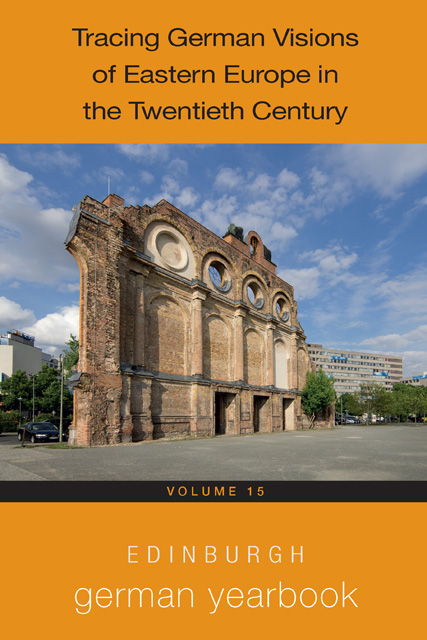Book contents
- Frontmatter
- Contents
- Miscellaneous Frontmatter
- Between Estrangement and Entanglement: An Introduction to German Visions of Eastern Europe in the Twentieth (and Twenty-First) Century
- Colonizing a Central European City: Transnational Perspectives on Kronstadt/Braşov/Brassó in the First Half of the Twentieth Century
- Exile as a Literary-Political Mission: Leo Katz’s Antifascist Bukovina Novel Totenjäger (1944)
- Brunnenland: The Image of the Bukovina in Paul Celan
- “Auch bei uns im fernen Transsilvanien”: The Transylvanian Saxons and the Long Shadow of the Third Reich in the Work of Bettina Schuller
- Through an Orientalist Lens: Colonial Renderings of Poland in German Cinema after 1989
- The Nazi Ghost and the Sinti Woman in Kerstin Hensel’s Bell Vedere (1982)
- The Haunted Landscape of Babi Yar: Memory, Language, and the Exploration of Holocaust Spaces in Katja Petrowskaja’s Vielleicht Esther (2014)
- “dann hüpfe ich auch, komisch und ungeschickt, wie eine Nadel auf einer abgespielten Platte …”: Translational Ethics and Affects in Katja Petrowskaja’s Vielleicht Esther (2014)
- Expanding the Nationalgeschichte: Multidirectional European Memory in Nino Haratischwili and Saša Stanišić
- Reading Photographic Images and Identifying Mnemonic Threads of the Post-Memorial Project in Sie kam aus Mariupol (2017) by Natascha Wodin
- Navid Kermani’s Entlang den Gräben (2018) and Its Readers: Remapping Europe’s East
- Notes on the Contributors
Reading Photographic Images and Identifying Mnemonic Threads of the Post-Memorial Project in Sie kam aus Mariupol (2017) by Natascha Wodin
Published online by Cambridge University Press: 11 January 2023
- Frontmatter
- Contents
- Miscellaneous Frontmatter
- Between Estrangement and Entanglement: An Introduction to German Visions of Eastern Europe in the Twentieth (and Twenty-First) Century
- Colonizing a Central European City: Transnational Perspectives on Kronstadt/Braşov/Brassó in the First Half of the Twentieth Century
- Exile as a Literary-Political Mission: Leo Katz’s Antifascist Bukovina Novel Totenjäger (1944)
- Brunnenland: The Image of the Bukovina in Paul Celan
- “Auch bei uns im fernen Transsilvanien”: The Transylvanian Saxons and the Long Shadow of the Third Reich in the Work of Bettina Schuller
- Through an Orientalist Lens: Colonial Renderings of Poland in German Cinema after 1989
- The Nazi Ghost and the Sinti Woman in Kerstin Hensel’s Bell Vedere (1982)
- The Haunted Landscape of Babi Yar: Memory, Language, and the Exploration of Holocaust Spaces in Katja Petrowskaja’s Vielleicht Esther (2014)
- “dann hüpfe ich auch, komisch und ungeschickt, wie eine Nadel auf einer abgespielten Platte …”: Translational Ethics and Affects in Katja Petrowskaja’s Vielleicht Esther (2014)
- Expanding the Nationalgeschichte: Multidirectional European Memory in Nino Haratischwili and Saša Stanišić
- Reading Photographic Images and Identifying Mnemonic Threads of the Post-Memorial Project in Sie kam aus Mariupol (2017) by Natascha Wodin
- Navid Kermani’s Entlang den Gräben (2018) and Its Readers: Remapping Europe’s East
- Notes on the Contributors
Summary
German-speaking writers with familial affiliations in Central and Eastern Europe employ literature as an important tool to reveal aspects of the European past that have yet to be accommodated in the literary landscape of German-language fiction. Through the recollection of their personal memories and those of their immediate family members, these writers not only skillfully register the turbulent influence of historical catastrophes on the intimate, private sphere of their families, but also offer a platform to integrate distinctive and specific memories from other parts of Europe into German literature and strengthen its transnational makeup. Against the backdrop of contentious memory politics in Germany and by extension in Europe, this essay examines the post-memorial use of photographs as mnemonic artifacts in the work of Natascha Wodin. In her autobiographical novel Sie kam aus Mariupol (She Came from Mariupol, 2017), she creatively meditates upon the historical complexity associated with the trauma of her mother, who was deported from Eastern Europe to Nazi Germany as an Ostarbeiterin during World War II, and sets out to uncover the largely unremembered phenomenon of Nazi forced labor, especially in relation to the individuals who were deported from occupied Eastern European states into the Third Reich. In this process, Wodin uses techniques of “imaginative investment, projection, creation” as tools to work on the juxtaposition of photographic images within the narrative economy of the text. While her post-memorial project enables Wodin to point out the lacunae in the dominant European memory discourse, it also forms a literary platform where a productive interaction between the individual and collective memories takes place.
The “Eastern Turn” and the Diversification of the European Memory Landscape in German Literature
German-speaking writers with a transnational background or family histories in Central and Eastern Europe have played a crucial role in transforming the mnemonic landscape of German-language fiction and carved out a distinct place for themselves within the literary scene of the past few decades. Drawing on the notion of a “Turkish turn,” in German-language literature that had been analyzed by Leslie Adelson several years earlier, Brigid Haines, in a key article taking stock of this development in 2008, identifies their collective literary voice as evidence of an “Eastern Turn.”
- Type
- Chapter
- Information
- Edinburgh German Yearbook 15Tracing German Visions of Eastern Europe in the Twentieth Century, pp. 242 - 261Publisher: Boydell & BrewerPrint publication year: 2022



